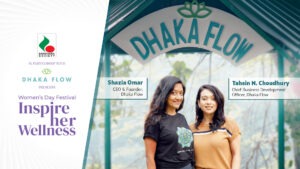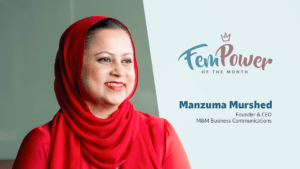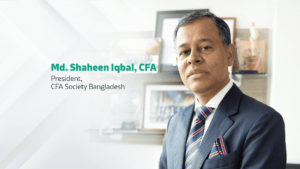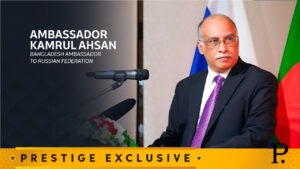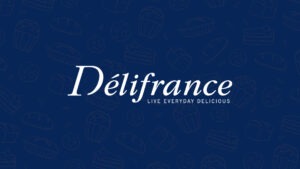1. Please tell us about yourself (i.e. your childhood, education, hobbies, who you are as a person, etc.).
Born in Chattogram as my grandparents were settled there for their jobs and livelihoods, but raised in Dhaka, I grew up in a wholesome privileged family with a safe and trusting atmosphere. Being my parents’ firstborn, and the most adored and pampered grandchild on both my maternal and paternal side, I found myself ridden with great expectations.
My beloved parents have always enrolled me in academic institutions that were within the locality of our residence. I completed my S.S.C from Banani Bidyaniketan School & College, as we used to live in Banani, during that period. But later, when we shifted near to Uttara, I was enrolled in Rajuk Uttara Model College, where I completed my H.S.C. Following that, I pursued a major in Marketing at North South University (NSU), although Economics fascinated me the most.
During my academic life at NSU, I became a member of the Young Entrepreneurs Society (YES) club, where I was acquiring knowledge on numerous variables entailing the marketing sector and its academic application. Having successful marketeer acquaintances within my social network, I was reached out several times with opportunities of gaining hand-on experience in the agency life. Since advertising was a crucial part of marketing, I quickly jumped on the offer. It was very intriguing to see things happen in the real world, things that I just started to learn about through my academics. And things just escalated from there on!
2. You started your career from an advertising firm and have the experience of working for Samsung and IPDC. Now, you are an entrepreneur yourself as well as working with Concito PR, an agency. How would you describe your journey?
I grew up with a nurturing mother and was fairly independent from a young age. I was never really comfortable asking for money, growing up. I always wanted to take care of my own needs. At 18, I actually started working at an English medium school after joining NSU. The salary was good, and it enabled me to pay the majority of my own tuition fees.
Following that, I landed a job as a Management Trainee at ‘A Positive’- an advertising agency located just next to the NSU Banani campus. Although the pay was comparatively less than that of the school job, I loved it. After all, I was pursuing my passion – marketing.
As my marketing journey unfolded, I found myself deeply involved in several departments from across the marketing value chain. In the first three years of my professional career, I had been part of three different agencies, working closely with the creative side of brand development as well as the client-facing services side, and I learned how to balance both sides in order to achieve the best outcomes possible. However, as I became more seasoned as a marketing professional, I found myself moving over to the client end of the value chain. Soon enough, I joined Samsung’s brands team, and sooner still, I found myself working with the creative agencies I knew so well, to design and execute effective brand and product communications solutions.
During my time at Samsung, I was allowed to explore and exercise the depths of my creative freedoms and was able to experiment with and synthesize ideas to produce more creative and cost-efficient solutions that, I am sure would be considered usual today, given the level of ground that has been covered since then. I had a very fulfilling 5-year tenure at Samsung, and my time there has certainly helped shape who I am today.
It was towards the end of my time at Samsung when I was approached by Beximco with the opportunity to build a brand from scratch and roll it out nationwide. At Samsung, I had the privilege of working with a new campaign every other month, but I was working with already established brands. As you can imagine, I was very enticed by the offer, and I took it because of the irresistible opportunity to shape and structure a brand from the ground up.
I’ve always believed in my ability to build things from the ground up, so when I was approached by IPDC to exercise and supplement my skill set in the finance industry, especially during a time when the industry was going through a mass restructuring phase, I took a chance and moved to IPDC. And the reason I took that chance was because I felt ready to brave that industry, with my already existing 8 years of marketing and communications experience.
Very early into my career, I had decided that I will work for about 10 years and then create something that would be my own. And, when I was done with those 10 years in 2018, I started to think about the eventual next step – how to become an entrepreneur. When I was working at IPDC, I realized that it gave me immense pleasure to give back to society. Also, I wanted my journey to inspire and empower women so that they could achieve at least as much as I did, if not more. Moreover, the PR work of IPDC helped me realize that I enjoy interacting with people and engaging in meaningful conversations that yielded results.
But remember, whatever you do in life, you need the perfect team to make it work. Of course, the word ‘perfection’ is subjective but what I mean by that is this – a group of people working together and contributing towards one shared vision with utmost synergy.
I feel there is a market gap that exists between the client’s demands and needs, and the agency’s capacities and willingness to adhere to a certain standard. Since I’ve had the experience of working on both sides, I believe that my expertise can mitigate that gap. And unsurprisingly enough, I am currently involved with an agency as part of my entrepreneurial journey.
I am also proud to say that I am a trustee of the Bangladesh Cancer Aid Trust (BANCAT). I have lost key family members to this deadly disease and also know people who are currently fighting it. I have been involved in the nation’s fight with cancer for a good period of time now, and am currently trying to gather funds in response to the ongoing pandemic and the victims through initiatives like that of ‘Esho Shobai’ and many more.
If you ask me, personally I would describe my journey as a passionate warrior who is relentlessly trying to make things better for herself and everyone around her.

3. In which sector did you enjoy working the most? Which organization did you have the best experiences at?
I don’t think you can exactly coin it as a sector, but as I have said before I consider myself a creative person who wants to redesign things from scratch. I knew marketing is the area where I wanted to thrive. It became my passion when I studied at NSU and worked at agencies simultaneously. When I first joined the agency life, I had planned on spending at least 3 years in that specific industry before moving on to something new. But as I see it now, my fate had something different planned for me and I ended up spending more time in the creative sector than I had initially intended to.
Every organization I worked for, has become a very important part of my life. I gave them my heart and soul. At different stages of my career, different levels of emotions were at play.
But I think those 5 years at Samsung was the epitome of my career. Ahh, those were the golden days. I have learned so much from that time and that place. I learned how to attain success and sustain it, how to deal with failure and work harder to achieve my goals, and how to manage everything to meet my targets. They didn’t really have deadlines, but there was always an urgency to do things immediately. It was a rush! I felt every move I made had consequences. But, looking back now I realize that it molded me in the best way possible enabling me to focus on the bigger picture now.
4. Could you tell us about the projects you are working on right now?
Currently, I am the proud family member of a creative PR firm – Concito. But besides that, I have also started another communications venture in Singapore named C Three Sixty. Communication is a wholehearted passion of mine. I believe it’s an art form. I really do not want to confine myself to the local scenario, rather I want to play it big – global! I believe in helping existing firms rather than creating my own one to compete with others. Connecting the dots. Basically, our business model is such that my business partner and I will be leading the business to help our partner organizations to run their operations, and then we’d all share the revenues. Revenue is a relative term, rather we want to share accomplishments of any big or small successful campaign.
Although I have been involved with BANCAT and busy with a women empowerment project under WEDO just prior to the lockdown; I was really looking forward to 2020 for a while because I believed it’d be another turning point in my career. But now it seems to be a turning point for everyone, haha. The reason why I’m into multiple projects is that I want to try out new things until I know what to devote all my time to; I want to keep moving forward. And the world is really changing. Maybe half of them will work out, while the other half don’t. But I will always learn something new out of them, and the ones that do work out well will get my undivided attention from the following year.

5. Since you are involved in so many projects, could you please tell us the secret to successfully multitasking and how to enjoy it?
For multitasking, you need to know the art of work delegation. If you don’t know whom you can trust with what, then you’d face problems. They would do everything according to plan until and unless there is a crisis that you’ll have to pay attention to. And, you’ll just have to keep track of everyone’s work.
There’s a certain mantra to who and how I delegate tasks. The thing is, I emphasize building relationships which helps me to identify people’s strengths and weaknesses and following that I assign individuals specific roles to play. Their interests play a vital role in their work ethics too, so I always try to keep that in mind as well. And, obviously, I guide them as to how I want things to be done and also ensure that they know that I care about them and that I value them as individuals; as human beings. This encourages them to be open with me about their problems and give their best. It’s all about empowerment.
6. Please share something about the PR Industry since not many people are fully aware of it. How does this industry work? What do you think about the growth of this industry?
The PR industry is still at its infant stage; its concept is quite new in Bangladesh. It has a very broad role to play in all businesses and organizations like it already does in our neighboring countries, but the local scene has not experienced its true potential.
PR is not just about press releases nor just about bad reputation management; we have to share complex strategies while rationalizing the pros and cons of diverse brand stories. People do not buy products anymore; they buy stories. It is the very thing that keeps the audience engaged over a long period of time, but the local market is still unevolved to understand the power of stories. They often miss the bigger picture and focus on short term yields. It is not sustainable. There is a large spectrum of opportunities that should be taken advantage of.
7. You are currently involved with Bangladesh Cancer Aid Trust (BANCAT), a non-profit organization. Tell us about its vision and your role in it?
We host fundraisers and the money is used to pay for the hospital bills of marginalized people. We usually focus on helping kids and mothers as they seem to need it the most. We are also hosting webinars where cancer specialists and cancer survivors share their stories which in turn enables and empowers both the cancer patients and relevant stakeholders. This also helps us to devise our next moves in terms of financial mobilization that would aid the survivors.
Since the first priority is being given to COVID-19 patients now, we are talking to hospitals to give special treatment to cancer patients in need.
8. You are playing the role of CEO at Woman Empowerment and Development (WEDO). Please share your experience and tell us its future goals.
I am so glad you asked. This specific venture is a platform that amalgamates accomplished female mentors with female mentees in need of guidance to go the extra mile and helps these mentees to envision and actualize the best version of themselves through empowerment by example, intensive training, skill development, and reward programs. The discarded ambitions of women from all walks of life, who have to unjustly compromise their development prospects under the influence of social pressure, is something we are very familiar with.
But the strength and poise of an empowered woman can be powerful. The objective of WEDO is to empower every woman that needs a boost to go the extra mile and realize their development potential.
Prior to the lockdown, we have been able to bring in 8 different regions of Bangladesh under the umbrella of various developmental training initiatives aimed at nurturing these women to achieve their dreams.
Although the lockdown has impacted the pace of operations we will be picking up a few projects with financial brands, and their specialized women banking counterparts.

9. According to you, what are the biggest challenges women face in leadership and entrepreneurship?
First and foremost, the biggest challenge a woman faces in leadership is herself; underestimating their own potential capacity. It may be because of their family and society, but women have this mindset to treat themselves as inferior to others’ around them and that it’s okay for them to always make the compromise. They often doubt themselves when taking a lead role with the prejudiced mindset – ‘It’s a man’s job!’ They often fail to see that our Prime Minister is a woman herself.
Second would be parents sacrificing/hampering their daughter’s education/business in times of crisis even though it is the daughter’s basic right to be treated the same as the sons in the house. Also, society doesn’t really encourage women to take chances to develop their business and tell women to be happy with what they have, as if they don’t even deserve what they already do. Society often fails to empower and support women in achieving great things.
Keeping all of these in mind, at WEDO, we have three values – integrity, self-reliance, and inclusion. There is often a misconception about the bargaining power of women. As if her ability to empathize will lead to an inefficient financial decision. Caring too much is never a problem. We want to enable women in a way that they are no longer taken advantage of. We want women to be included in every human aspect of society.
10. What will be your tips for those who are just starting their career? Do you think having diversified experience in different sectors is beneficial or it’s better to stick with one single expertise and gain experience in that particular field?
The young generation is so restless and they tend to rush their decisions. They may want to shift from one job to another thinking that it isn’t the place for them only after 2-3 months of working there. They compare their lives with their friends and get disheartened if it is a little bit inferior in any manner.
I’m not against them experimenting but I want them to always have a purpose. If they want to get a job elsewhere, they should, but I want them to keep in mind why they’re doing so and think of the bigger picture.
Once people have a vision, they should do whatever they can to achieve their goals. If they need to experience various fields, they should go for it. If they need to devote themselves to one field, they should do that. Everyone has different dreams and there is no one path to follow to gain success in life.
11. What is your view on youth doing voluntary social work and getting involved in extracurricular activities? How can they use this quarantine more effectively?
I have worked with many enthusiastic young volunteers and I support them wholeheartedly as people get to experience the school of hard knocks at a young age. When they help people in crisis, they tend to easily get over petty details of their own lives. If they see someone struggling to get food for their family, they realize that not getting the latest iPhone isn’t the end of the world. They start to appreciate their blessed life while being motivated to help others in need by coming up with their unique ideas.
Seeing is believing, and since today’s youth have not faced a war like that of 1971 like many of us, they are now learning the realities and hardship of life by experiencing the pandemic, which has brought down the globe to its knees. They are learning to be compassionate, empathetic, and helpful. Also, volunteer-work brings out the good in a human being.
I think the youth should do a self-assessment and understand what skills they’re lacking and work on those to cope up with the world. They should also atone for things they did wrong in the past and work on their unfinished matters. They know better now.
12. How did the pandemic affect your work and regular lifestyle?
To tell you the truth, at first, I was a bit disappointed. But I do not let that weigh me down anymore. My entrepreneurial debut took place just weeks prior to the lockdown. Our organization had so many big plans to be rolled out. We were supposed to achieve so much more this year. But the whole globe has been brought to a standstill almost. We are caught in an unprecedented pandemic, that too, in a fast-paced, globalized world.
But now, more than ever before, I would like to look at the picture as ‘glass half full’. The pandemic has shed light on so many existing weaknesses within the social and economic systems around the globe. Since I had so much time to reflect on everything that has been happening all around us and our plans, I believe we can now execute the projects in a completely different manner, taking into account numerous new factors that need to be integrated. We can do it better now; once the pandemic has been dealt with. We will be older and wiser then.

13. What is the first thing you want to do after getting out of this quarantine?
I am actually in Noakhali right now with my family, so I guess the first thing I’d do is go back to Dhaka. For the past 3 months, I have been loving the exposure to nature but I really miss my Dhaka life. Prior to this, I’ve spent so much time outside Dhaka only once, the first time being a 6 months period of abroad living in the USA; when my kids were born. I have been dying for a long drive around Dhaka city. I hope by then the pollution in Dhaka’s atmosphere will have subsided a little, haha.
14. What will be your message for today’s youth?
Purpose, passion, and perseverance. If you do not have passion, you do not have the fire within you to fight for what you think is just! And if you do not persevere, you will give up on things before even wagering in your best effort.
But above all, you need to have a purpose for you to be passionate and to persevere for.
Strong will power and patience will help you to achieve your purpose. The youth today has the potential to nurture a world that we only hypothesize. And the path to salvation is filled with obstacles. You cannot give up on that purpose. Only passion and perseverance will separate you from the ordinary and the dreamer, and enable a doer.

